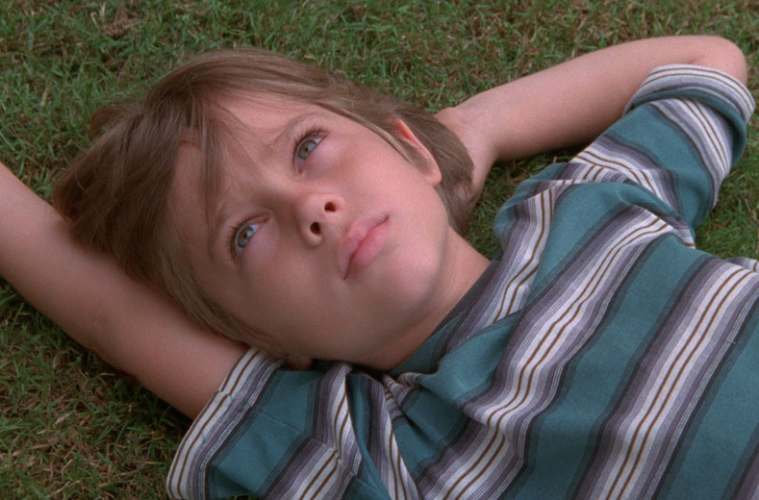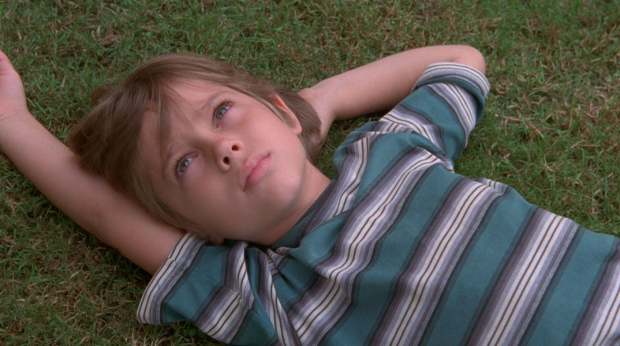
Filmed over the course of twelve years, Richard Linklater‘s sprawling, intimate Boyhood “is a film of many small moments, all added together to make something quite wonderful,” as our Sundance review notes. A few days ago, after experiencing the writer-director’s phenomenal film that revolves around the once-young Ellar Coltrane, I was given the opportunity to participate in a roundtable with the two of them.
During our illuminating conversation at South by Southwest, we discussed why Linklater continuously uses cars as places to have extended conversations, how much pull Coltrane had on his own character’s looks and tastes, what Linklater sees as the benefit of the process, why he didn’t let his cast view what they shot through the years until the end, how nervous he was about keeping backups, and much more. If you’re interested in the film this will definitely give you some insight into the production and what it took to get the film made. There’s a few plot details that discussed, but it’s a great conversation before or after watching the film, and one can see it in full below.
You probably could’ve made this film in three months with two or maybe three kids of different ages. What would you have lost by doing it that way?
Richard Linklater: It was never an option, in my mind. The whole conception was to see someone actually age. I guess you could do any number of things and most narratives you have to if you’re telling a story. I think audiences get used to that. Usually you do the big leaps and if you make a big enough jump, like in Goodfellas, they’re kids and then they’re just adults. You can get away that.
That’s what we take for granted in film. The layer of this experiment is that you get away with that assumption.
Linklater: Well, the whole idea I had been thinking about a film about childhood and I was having trouble because I’d pick up a period of my own childhood that I thought was worth exploring. Then there were all these other parts — ‘well, that’s four years later, that’s three’ — there was a frustration. I was stalled out on that. It wasn’t happening. And then I had the idea, then it hit me, ‘oh, why not just film a little bit every year?’ That was the big idea. Such an impractical idea that it was, once that hit, it solved my problem. It feels almost like science or something in a scientific field, a lot of your thinking goes around solving problems or discovery. I thought enough about it and then out came this very simple idea, actually, that was right in front of my face, right in front of everybody’s face. It hadn’t been done probably for a lot of really logical, practical reasons.
When you cast Ethan [Hawke] and Patricia [Arquette] was it a case of telling them this the commitment you need to make for the next 12 years? And how difficult was that for them to commit to that? Was it like “sign me up?” or “I got to get back to you.”
Linklater: They were both, ‘Sign me up.’ That’s who they are. You didn’t want anyone who [said], ‘Let me think about that.’ It’s probably like, ‘OK.’ You want people who just jump in the pool. Both of them did that.
And were there times were in one year when one wasn’t available?
Linklater: If you notice…
Ethan wasn’t…
Linklater: He wasn’t in half the movie. I knew their schedules would never [work], so they were divorced from the very beginning. It was always tough. The practical things about shooting just every year was a bit of a scheduling thing.
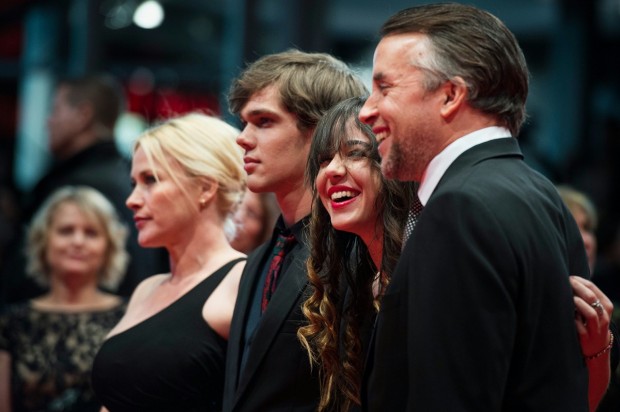
Can you talk about you presented the idea to Ellar’s parents when he was a child?
Linklater: Yeah. That was the big leap. I always say this about Ellar, I was casting the guy I met when he was six — he was turning seven about the time we were shooting — but it was really casting the parents. He had cool parents, they were both artists. They had kinda strong Austin and Texas ties. I didn’t want him moving to Seattle in year two or three. I needed some amount of access I felt year-round. I saw it as an ongoing collaboration, ongoing project that we needed that was important. The family would get behind this as an artistic undertaking that would be a positive thing in their son’s life, not this horrible negative thing. They got it. They felt that it was worth doing that.
I’m curious for Ellar, and for you Richard, he mentioned you didn’t really show the cast the project throughout the process. It was more at the end, you put it altogether and showed them what you had done.
Linklater: Yeah.
What was the idea behind that? And Ellar, did you ever push to get glimpses of what you’ve been doing for the last 12 years at that point?
Ellar Coltrane: I think there was a time when I kinda wanted to, but seeing it now I definitely understand why I wasn’t shown anything, because it’s really quite a head trip to watch now at 19. It’s a lot to deal with and I can’t imagine what it would have felt like at 10 or 14 or anytime throughout. It would have messed with my head, definitely.
Was there ever a point at your more youthful end of the project where you found yourself losing interest?
Coltrane: I never felt like I was committed, like I was sentenced or anything. It was exciting. As the momentum built I got more interested in it.
Linklater: If you think about it, when you’re a kid you don’t commit to anything. Your parents are kicking you around saying, ‘Oh, you’re going to this camp, you’re doing this, you got to be in school. Oh, we’re going here on vacation.’ No one asks you anything. Ellar was pursuing acting. He had been in a film at that time. He’d been in a couple of other things, he had a headshot resume, he was in our world to whatever degree a six-year-old can be.
And so it was like, ‘Oh, good you have this thing you want to do every year.’ That could have changed, he could have realized he didn’t want to be an actor and hated movie sets and all that, but that didn’t happen. It was kind of a fun thing. We were the fun summer camp, film camp, or whatever we were. I hope. That’s sort of how it sort of felt with the crew, too. We’d all get back together. It’s really rare you get a chance in this world to work on something with no real thought or pressure of the end result. Sometimes when you’re working on a film you already have a release date, or expectations — ‘Oh, then we’re going to preview it on this day, post-production, [etc.]’ — this was just so abstract. It was just in the moment what we were doing every year. So it was really fun, free, low pressure environment. I think.
You were kind of able to play with the edit for 12 years.
Linklater: Absolutely.
Can you talk a little bit about how that might have effected subsequent sections?
Linklater: That was the methodology of the film. It was edit what we just shot, attach it to everything we shot before, whatever year you’re on, and then edit the whole movie again. Or at least watch it and think about it. Maybe there’s something from other years you might want to cut. But yeah, to the very end I was editing things from the first episode or two, ten years later. It’s rare you get that schedule or that chance to keep working on your sculpture, but it was the way the film grew too. I would watch it and think about what’s required of the next episode or what comes next. It was all sort of planned out, but I had to kind of feel my way through it.
Where did you store the footage every year? Because I would be so antsy that something would happen to that early stuff.
Linklater: Yeah, exactly. We had backups upon backups. We shot on film. It was in the lab, they keep it, there’s the vaults, and then you transfer it. But, yeah, there’s always that point in film where the negatives being cut somewhere. You just hope you get out alive. If you let your mind go there, there was a lot of volatility. If you just think about everyone involved. We’re all out in the world. Anything could happen.
There are moments that are almost pre-cognizant, like the Star Wars discussion that was filmed years ago.
Linklater: That gets a chuckle this year. But a year ago, two years ago, it wouldn’t it would have been just kind of what it was.
How did you encapsulate a time you were shooting so well? Was that just luck?
Linklater: You just be of the moment. At that very moment, Ellar, you had been playing that game right?
Coltrane: That was really the first piece of dialogue that you asked me to type it.
Linklater: I was pulling more and more out of Ellar every year and then we worked up that scene around you had that theory about that the game would make a good movie.
Ellar: And there was a lot of it. A lot that dialogue.
Linklater: It was always going to reflect the culture — presidents, reelections, wars — but kind of from the kids’ perspective. I remember in my childhood, just scenes, what you see on TV, music you might hear on the radio, TV shows or little bits you might remember. Presidential elections come and go, you know, little signposts, but not see any of it as too big a deal. It’s really from their perspective.
We talked about you seeing the film for the first time. So sitting there, how are you processing this? You have twelve years of memories that are hitting you in one go. Are you sitting there looking at a scene going, ‘I can’t believe how young I was or what was happening there. I couldn’t remember that moment…’
Coltrane: Yeah, it’s strange. There are definitely parts that I remember very clearly and I can remember the year, the time leading up to shooting it, and what was going on that year. It’s equally strange to have times I don’t remember at all and years I don’t remember shooting, that I don’t remember that year even, really. Also remembering times in between the shoots that were missed, especially in high school, when I was cycling phases very rapidly, it’s like there are entire kind of periods, I remember as very specific periods, that aren’t on the film and some of them I’m pretty grateful for.
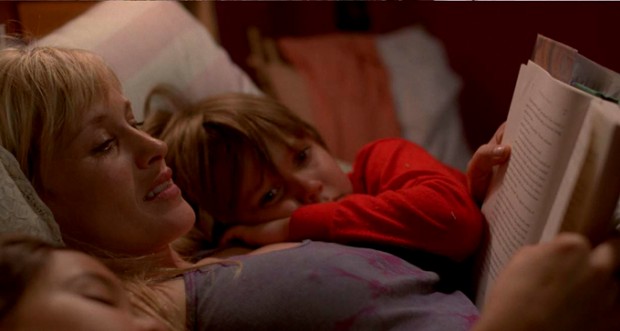
As your character stands in for the whole experience of boyhood, when you were watching the film, were you able to divorce yourself from the character and put your own experiences into it? Were you able to look at your own life through this character?
Coltrane: I try not to, really. More than anything it’s so…that’s just how it is for me…at a basic point it feels like me and my life and so much of it parallels things that have happened in my life. I really try to just take myself out of it as much as I can when I watch it and I feel like I get a much more valuable experience. Not trying to put my personality into it any more than is already there because it’s already…it’s there whether I want to see it or not.
Linklater: Such a unique position Ellar and Lorelei, too, have been put in to see themselves. It’s one thing to look through a family album but something about 35mm film feels so real; it’s photographed nicely, it’s lit, it’s not a home video. It feels more official and real or something in some strange way.
We really never see the step siblings again. What happens to them?
Linklater: In real life they’re fine, they grew up. They’re OK. And so is Marco, the alcoholic dad. He’s the nicest guy in the world. He’s a friend of mine I always make him play the bad guy, but he’s actually a total sweetheart.
But I’m worried about them living with that father.
Linklater: As is everybody at that moment.
But they have no way to protect them…
Linklater: A lot of life, these abrupt shifts, your family picks up and moves. As a kid you’re not the one calling the shots. You move, you change schools, you don’t see those people again often, people come and go. It feels kind of random sometimes.
You used the words episodes earlier and there’s no sort of overt call-out in the film. Did you ever consider putting that in?
Linklater: Oh, never. We had to call year six, year seven — we work in episodes, but the goal was to have no hints in the film itself. I didn’t want to tell you anything you had to pick it up yourself just by watching it. The transitions wouldn’t be too obvious or draw too much attention to themselves. I didn’t want you to be pulled out of the movie, really. If I would have said “2004: Year Three,” why? It’s not a documentary. I’m trying to pull you into a story about this family. That never figured in. I wanted to have a sameness to it.
A car seems to be such a big part of so many of your films. From what I understand, shooting in a car isn’t very easy.
Linklater: It’s a pain! And every year we’d have so much car stuff.
What was that experience like to kind of see yourself? Have you gotten better at it?
Linklater: No! It’s still a total pain in the ass and yet it seemed like a kid you’re always being transported from A to B either with your parents or…it figured into every story. You’re being driven around. Eventually you’re driving, which is cool. You have your own car. I don’t know. It was just all pervasive. I don’t think there was one episode we didn’t…it became a joke in the departments. ‘Well, what car shots are we going to do?’
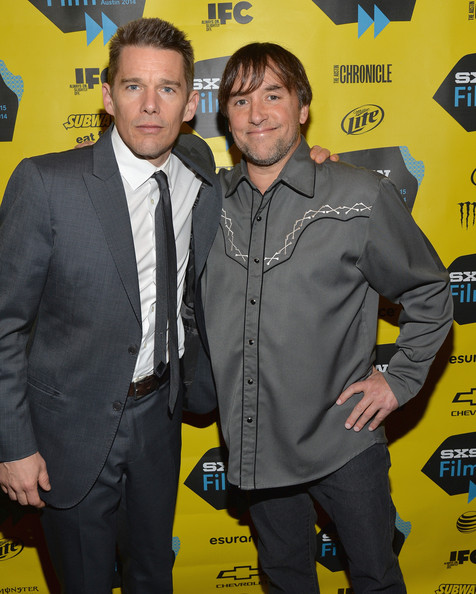
Did you have the basic story lines worked out from the beginning or did you adjust much along the way?
Linklater: The architecture was pretty set. Patricia talks about me telling her her whole character, like what’s going to happen and all that. I knew the last shot of the movie like year two or so. I knew the last shot, but that said, I got to spend that year thinking about every year, what it would be within in that structure.
There’s a great line in the movie, “It’s hard to make art.” I think this project epitomizes that. Obviously you were very confident in your performers and the story architecture, but was there was ever a point where it really seemed like an 11th hour thing? Like it maybe wouldn’t come together and how did you overcome that?
Linklater: I don’t know. In the indie world, if you don’t have money or much of a means, in this case, it’s good to have time. Like when I talk to directors who are like, ‘I’ve got 18 days and 120 thousand dollars.’ I said, ‘Well, take that month to rehearse and plan, because that’s what you have if no one is getting paid. The thing you do have is time, so use it.’ So that was the one thing we had on this, was all this time. I had, if you add it up, we had a year of pre-production, and two years of post-production. That’s what you wouldn’t have on a 39-day indie shoot.
So you see it as an advantage?
Linklater: Yeah. I played that card because I knew, it was like a sculpture or something; you had a lot of time to polish and think and remove and put back. That was the one asset we did have. We didn’t have much else on the technical, practical level, [but] it felt like we used that well. We were always ready to shoot. It was pretty methodical, really. I make all these films that seem like they’re thrown together or something but a lot of planning goes in them.
How did you pitch this to IFC? What if they said do you have footage that we could create half-hour episodes for TV?
Linklater: They did that. I think we even started off..I had done two films that IFC had been a part of, Tape and Waking Life, so when I had this idea, I guess in 2000 or 2001, I was talking to some people, and everyone kind of liked the idea. I would explain how the movie is going to be, and everyone was like, ‘Cool, but you’re asking me to put up money, but I won’t get any of it back for 13 years?’ I’m like, ‘Yeah’ and they’re like, ‘We just can’t do that.’ No one could wrap their head around it. But Jonathan Seering at IFC — because I had done these two films with him, and I think at that point they were a production company and they had a station — he was able to work it in their system as a long-term production. They said, ‘well maybe we can show 15 minutes in parts,’ and I was like, ‘Yeah, yeah.’ But then I was like, ‘No, absolutely not. It’s one, it’s one thing.’ I think someone suggested that recently — ‘oh, let’s show it in three’ — no, it’s one film.
Have you considered making follow-up films about Mason, kind of like you did with Celine and Jesse?
Linklater: Not really. This was so on the grid. Those are easier because you get this eight-year hiatus. If we were doing it, I would have to be working on it right now or something. I’m kind of glad not to be.
Are you not filming this? [laughs]
Linklater: It’s a reality show! If you look there! It’s a full time 24-hour Truman Show!
The film evolves as Mason’s life evolves. He gradually starts getting into Vonnegut and starts getting into enlightenment stuff, and since you yourself had sort of a jock trajectory, I’m wondering if you could talk a little bit about when you started having these ideas that would turn into your early films?
Linklater: My own life was different than Mason’s in one regard. I was on sports teams and stuff, but I was also at the writer’s fair and I wrote on the newspapers staff and I was a photographer — I was doing all that too. I just kind of suppressed one side of myself and emphasized another, as far as my own memories and who my friends were.
What were some yearly things that planted the seeds for that sort of far-out thinking?
Linklater: I was always a writer. I was the kid in 5th grade, everyone has to write a short story and then my short story would get read in front of the principle or we all had to write a play and mine would end up being performed for the faculty. I was always a writer, I guess, and a bit of a director too. I ended up kind of directing our sixth grade production of Julius Caeser. I didn’t want to act, we all had to go for a part, and I’m like, ‘No, I think I should just be in charge of everything.’ The teacher’s like, ‘OK.’
Can you talk about why you cast your daughter and directing her. That one scene where she’s talking with Ethan Hawke…
Linklater: …it was so uncomfortable.
But so natural.
Linklater: Yeah, I had a privileged access, you would say, to what she was always going through at any time. I remember in Germany some guy accused me, ‘You dragged your daughter through this film.’ What? Like she had been an abused child. And so I go out and say she would have run away from home or disowned me as a father had I not cast her at age eight when she was the little girl singing and dancing. She had been in Waking Life, she had a little part and she was always on movie sets, she just grew up around it. She, at that point, was much more extroverted than the mature person she became. What little girl doesn’t want to do all that? She very much wanted to.
I talked about casting Ellar’s parents and how important that was; at least I knew with her I would know where she was and I could manipulate her into whatever I felt. One less volatile element would be a good thing for the movie, maybe. It was a lot like Ellar, someone whose not really a trained actor. For a while there you work with them like you would any kid. It’s a little bit of manipulation, but I’m pretty much a collaborator. I knew what things she was doing that year, some obnoxious trait or something I thought was funny. I’d say do that little mouth [makes mouth popping noise] whatever. And she didn’t have any problem with that. Like she says, three years in it was the Harry Potter years and she wanted out. ‘Can my character like die?’ ‘No,’ pause. She knew I wouldn’t want to hear that. ‘Can I get out?’ I’m like, ‘No.’ Then she got older. She was more conflicted about it than Ellar ever was.
This is such a Texas film and obviously you’re a Texan filmmaker. Can you talk a little about the choices the family’s journey across Texas, how Texas traps them?
Linklater: Yeah. Well, Texas is so big it took me a long time to realize. I felt like I’d been all over five-hour drives. If you’re in the northeast you’ve been through three or four states, but I realized I was 20 and I’d never left Texas, but I’d felt I’d been everywhere. Well, we were in Mexico for like two days right on some border town. You get these different looks. West Texas is so different than east Texas. A big city like Houston, it’s like the fourth largest city in the country. I had a huge of variety to where I moved and where I grew up and everything, it was still kind of trapped. I kind of had this notion of that we’re just sort of trapped inside of the border of Texas. By childhood, you’re trapped in 12 years of this, you’re trapped in your parents’ house, you’re trapped in your state, but that was the thing at the end. He wanted to get as far away from home as possible. But still, it’s a long way. You’re halfway to LA at that point, but you’re still in Texas.
Can you guys both talk about that feeling when the movie is wrapped, edited, and this thing i’ve been a part of for how many years is actually complete?
Linklater: That part is still going on. I think we were moved by the last shooting when we wrapped in October. We shot out in west Texas in Big Ben. The last shot of the movie is the last thing we shot. As the sun went down… you know everything on this movie has been times 12. Usually when you call ‘martini’ in the last shot of the movie, even if it’s a short shoot, there’s this pressure, but you can imagine after 12 years saying this is the last shot of the movie, you could just feel it in the crew and the cast. The atmosphere of that was so beautiful and yet the sun was going down, we had a short amount of time. It fit the whole film. Hurry up and yet… be moved.
Coltrane: Pressure, but all wanting to ethereally experience our kind of graduation.
Linklater: Working on this movie, I had a lot of things I just never felt before. That ending was really…kind of magical. Bittersweet.
Ellar, you mentioned yesterday that you were a big fan of Tool, and bringing your own personality into this character whether it’s from the hair, the way you dress, the music you listen to, I can’t help but notice you didn’t work in Tool into the soundtrack. How much was there a give and take on that aspect?
Coltrane: I mean it grew definitely a lot as i got older. the two paths intersected so to speak. My tastes and styles being projected a lot more onto Mason than they ever were, because I was pretty out there as kid; it’d be hard to relate.
Linklater: Ellar wasn’t your normal seven or eight or nine-year-old. His taste was kind of outside the norm for his age group. My daughter Lorelei, too; she was kind of a medievalist. I don’t think she had real reference to Britney Spears at that point. She was singing and dancing to Gentlemen Prefer Blondes, Diamonds Are A Girls’s Best Friend, that was the thing I sort of based it on. I had her do that to this other song. She’s in another decade, another century. So it was taking these two kids and making them a little more dorky than they actually were. Every time I’d ask Ellar at age 10 what are you listening to, I’m hoping to get some pop culture that is not what I’m listening to and it was always, “I like Radiohead‘s new album.”
As you did sort of get older and come to realize who Richard Linklater was and become kind of aware what you’re involved in can you discuss that realization and the gravity of becoming of aware of what the process was you were involved with?
Coltrane: Well, yeah. It was very much at the same time. I think that I started to become interested in painting and visual art and photography and just kind of art in general. It’s a very deep artistic process that…I mean making film at all…but especially Rick and just his method. I don’t know.
What was your introduction? What was the first film you fell in love with of his?
Coltrane: Oh God, I don’t know. Probably Waking Life. Apparently I said in my audition I told him that Waking Life was my favorite movie.
Linklater: There is no way a six-year-old had seen Waking Life.
Coltrane:: I had! I think my parents made a point of showing me a bunch of your movies, so that I would have…
Linklater: That’s irresponsible!
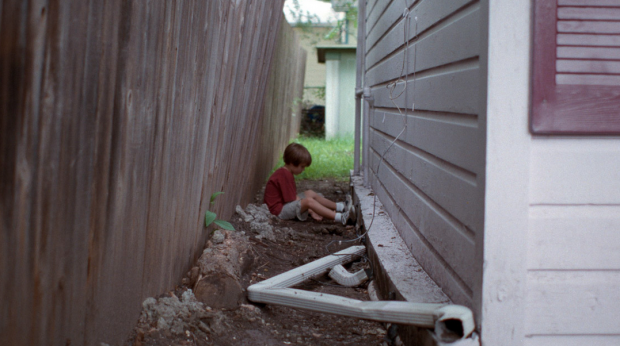
Boyhood opens this May.

